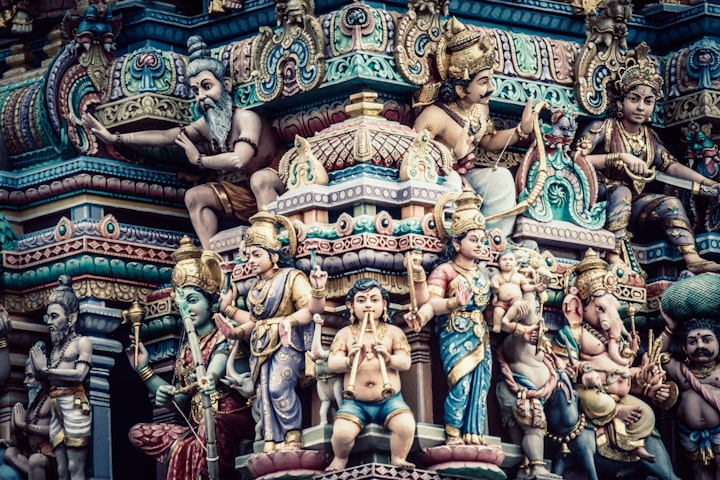The Greatest War that took place - the Mahabharata (the Great Indian War)
by Anshuman Kumar

There are many fantasy worlds out there but I think the best fantasy world would be that of the Mahabharata (the Great Indian War). Written more than a thousand years ago by Ved Vyasa it chronicles the war between two royal families - a bloody war that took place over 18 days and claimed thousands of lives. Ved Vyasa wrote this epic that has 90,000 couplets and is considered to be the longest epic in the world.
In 1998 a television show was produced based on the Mahabharata in India. It was about 93 episodes I believe. I had the good fortune of watching all the episodes. By watching the episodes I came to know the details of the epic. I do not think that one story or set of stories cannot have such a diversity of topics covered in a fantastic world such as has been done in the Mahabharata. It deals with so many topics: oaths, love, royalty, right to throne, nepotism, rivalry, animosity, war, abuse against women, justice, morality, bravery, friendship and a lot of others.
I will deal with a few topics to highlight that the Mahabharata is the best fantasy world out there. They are as follows:-
1. Oaths:- While the Mahabharata has several oaths in the story, there is one extremely powerful one. When I first heard of it I was completely amazed and thought it would be impossible in our modern world. If such an oath is not very fantastic, then I do not know what would be.
In the beginning of the epic, Prince Devavrata seeks to help his father King Shantanu. Shantanu was in love with a young fisherwoman Satyavati. Shantanu’s wife Ganga had left for the heavens many years ago (her tale too is quite marvellous). Shantanu went to meet Satyavati’s father and asked her hand in marriage. Satyavati’s father agreed but asked Shantanu to guarantee that Satyavati’s future son will be the heir to the throne. Shantanu refused this condition because he did not want to be unfair to Devrata. Later Devrata is able to find out about this condition by meeting Satyavati. Without telling his father he goes to meet Satyavati’s father. Satyavati’s father reinforces the condition that he told before. Devrata mentions he will abdicate his right to the throne. Satyavati’s father retorts by mentioning that how will he guarantee that his children abdicate the right to the throne. Upon hearing this Devrata gets furious but makes a very powerful oath. He looks to the skies and declares that he will live a life of celibacy till he dies and will not marry. There is lighting and thunder as the gods in the skies are pleased with such a wonderful oath. Satyavati’s father agrees and she is married to Shantanu. At first Shantanu is shocked by Devrarata’s oath but Devrata makes him understand. Devrarata lives a long life but never breaks his oath. Due to his oath his name was changed to ‘Bheeshma’, which means rigid. I have always been fascinated by Bheeshma’s oath. It has to be one of the toughest oaths that anyone has ever taken in human history.
2. Morality:- In the middle of the Mahabharata, five royal princes who were brothers, are banished for 13 years due to a cruel plot hatched by their greedy and unfair cousins. These five brothers, Yuddhisthira, Bheema, Arjun, Nakul and Sahdev are also the main protagonists of this epic. While there are many references and examples of morality in the epic, one incident highlights it very well. Towards the end of their banishment, the five brothers are crossing a forest with their common wife Draupadi (another interesting tale of how that happens). Draupadi feels very thirsty and requests water. The youngest brother Sahdev goes to a nearby pond to get some water. As soon as he tries to take some water in a little bowl to bring back to his family, a demi-god in a tree tells him that the lake belongs to him and he must answer a few questions correctly before he can take the water. Sahdev refuses and gets angry and takes the water without permission. He instantly dies. After a while, Nakul comes to get the water and undergoes the same fate. Then, Arjun does the same thing and he dies as well. Afterwards, Bheema comes to get the water and does not listen to the demi-god and he dies too. Finally, Yuddhisthira comes to fetch some water. He is sad to see his dead brothers. When the demi-god asks his questions this time, Yuddhisthira patiently listens and answers all of them. The demi-god is very pleased with Yuddhisthira’s morality. He asks that besides taking the water, Yuddhisthira should request four boons from him. For each boon, he asks the demi-god to make one brother alive again. The demi-god is very glad as he hears each boon and one by one makes the other brothers alive.
I am overwhelmed by Yuddhisthira’s strong morals and great ethics. Due to his efforts, his brothers are granted life again. This is one of the most unbelievable things that has ever happened in a story. I find it very fantastical.
3. Friendship:- The main antagonist of the Mahabharata is Prince Duryodhana. He leads his 99 brothers against the five brothers mentioned in the last topic (morality) as he wants to usurp the kingdom from them. He mentions to Lord Krishna when the latter comes to mediate on behalf of the five brothers, “O Krishna, I am not willing to even give them land equivalent to a needle’s tip.” Afterwards due to this obstinance as well as other reasons a grand war does take place. Amongst Duryodhana’s lieutenants is his trusted friend Karna. Karna always supports Duryodhana. He has a better moral compass but still sides with Duryodhana even when he is wrong (which happens multiple times in the epic). It turns out that Karna was the eldest brother of the five brothers (who were actually six) but due to some circumstances his mother had to forgo him when he was a baby. He is raised by a poor charioteer and his wife. As an adult he does find out that he is a brother to the five brothers. He also knows that they are on the side of goodness while Duryodhana is evil. Later when his actual mother meets him and persuades him to join his five brothers for the war, he politely refuses. He says Duryodhana is his true friend and even if he is wrong, he will support him. He does not want to abandon his friend in favour of his actual brothers. Lord Krishna also tries to reason with Karna but he again politely refuses. When the war actually happens he fights against his brothers and is killed by the bravest of them all, Arjun. After his death the mother tells the five brothers that Karna was actually their brother and they are extremely sad to know that their brother died in the battle. Duryodhana is very sad as well as he treated Karna as his brother. They remained best friends till the end.
I find the friendship between Karna and Duryodhana wonderful and even though they are evil, their bond is somewhat redeeming. The sacrifice that Karna does for his friend is one of the best sacrifices I have ever heard in an epic or a story. It is very fantastical if you ask me.
So I described three major topics in the epic that make it the most fantastical world there is. When I saw the TV series years ago and later read a summary of the epic I felt transported to another world. A world that was beautiful, mystical and fascinating. This world had many good and evil characters and each one was unique and very interesting. Their individual stories, conflicts and challenges made this epic one of the most fascinating stories ever and the most fantastical world that ever was. I highly recommend other readers to see the TV series with subtitles and/or read the epic’s English version (full or abridged).
About the Creator
Anshuman Kumar
I live and work in Canada and am originally from India. I am interested in movies, short stories, swimming, travel etc. Tips are definitely optional but are very welcome. Thank you for reading.
My email is [email protected]
Thanks.






Comments
There are no comments for this story
Be the first to respond and start the conversation.